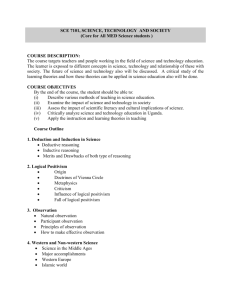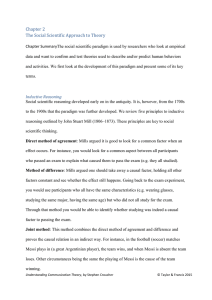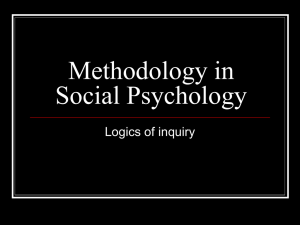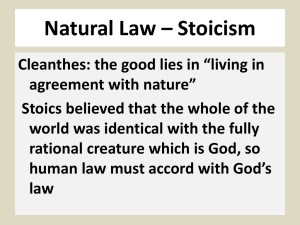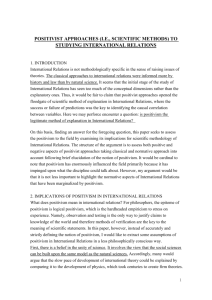Lecture 1: Introduction
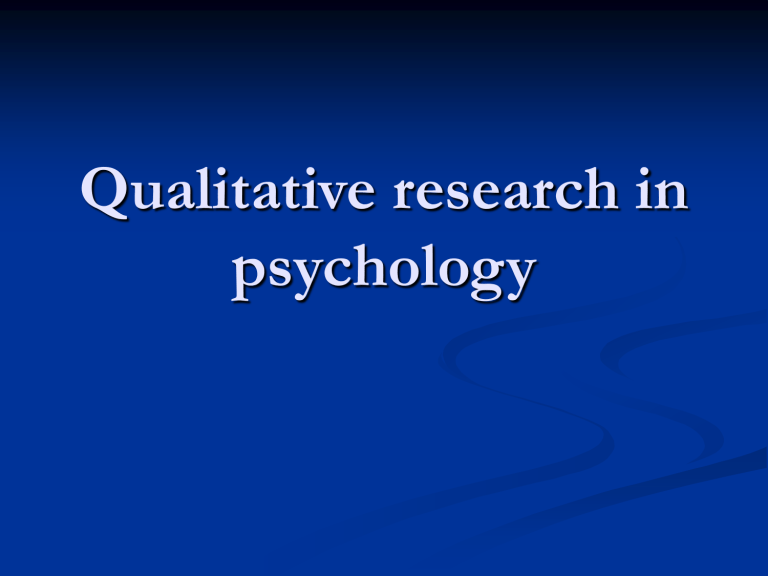
Qualitative research in psychology
A distinct research process
Inquiries of knowledge that are outside the framework prescribed by the scientific method, as well as assumptions of inferential statistics
Important to review modern philosophies of science which have set rules for how psychologists have thought about research for past 80 years.
Philosophy of science
Understand why & how philosophy of science is relevant to psychology
Appreciate the basic issues of hypotheses and disconfirmation
Be able to assess the relevance of different models of science to different areas of psychology
What is the ‘philosophy of science’?
concerned with the question of how we should carry out scientific research given our understanding of the nature of knowledge.
how most scientists actually work given the social and practical circumstances of their work.
Reality, Knowledge & Science
Philosophers interested in the relation between
Ontology (the study of what actually exists)
Epistemology (the study of what knowledge is, what we can know and what the limits of knowledge are)
Methodology (the study of the ways in which the world can be studied).
Definition Example in physical science
Is space infinite?
Ontology The study of what actually exists
Epistemology The study of the varieties, foundations & limits of what we can know
Methodology The study of means of investigating a phenomenon
What are the limits to our understanding of the relationship between time & space?
How should we study time & space?
Example in psychology
Is the mind part of the brain?
What kind of limits are there on our understanding of the link between the brain and consciousness?
How should we study the effects of drugs on consciousness?
Ontological assumptions
↓
Epistemological assumptions
↓
Methodological assumptions
What is science?
Objective testing of theories based on evidence
Public sharing of data
Theories competing with each other
Careful measurements/recording/data analysis
Therefore psychology is a science…?
Key concepts in philosophy of science
Positivism
Logical Positivism
Disconfirmation
Paradigms
Anarchy
Social Constructionism
Comte, Ayer and logical positivism
Auguste Comte (1798-1857) three phases of searching for understanding
theological ; metaphysical ; positive or scientific
Positivism ‘unity of science project’
process of induction.
Vienna Circle 1920s - ‘logical positivism’ emphasis on theories & logical deduction of hypotheses
Alfred Ayer (1910-89,) Language, Truth and Logic 1936. a statement can only be true only if
(i) it is a self-evident analytic, deductive truth (e.g.
‘2+2=4’)
(ii) the statement matches reality precisely.
Statements had to be verifiable to be meaningful. commitment to empiricism, checking ideas against the world.
not about the process of discovery per se - just specifying what should be permitted as scientific – conservative logical positivist criteria - Psychology borderline picked up by behaviourism.
Positivism
Facts
Facts
More facts
Generalise from those facts
= induction
Logical Positivism
Theory
Verifiability
Tests
Generalise
= deduction
Disconfirmation
Karl Popper (1902-1994) first major attack on logical positivism The Logic of Scientific Discovery
(1935 / 1959) verifiability encouraged confirmation of theories rather than genuine discovery; consistent evidence is merely corroboration.
Bold conjectures required by science
Disconfirmation/falsifiability principle: hypotheses need to be capable of being wrong
Several problems:
theories and observations are neither independent nor neutral
science is a practical business - find best answer rather than the application of logic
Science should proceed in 4 stages:
1.
2.
3.
Formal Stage. theory checked for internal consistency.
Semi-formal Stage. separate propositions which do/do not have empirical consequences
Comparison Stage. new theory compared with existing theories If it explains the same/less known facts then new theory
should be abandoned.
4.
Empirical Testing Stage. test hypothesis least likely to be true
- informativeness.
And if prediction not supported? still our best guess
Criticism: scientists propose ‘auxiliary hypotheses’
What are the implications of Popper’s ideas for how we think about psychological research?
difficulty arises when considering theories rather than hypotheses
Theories which are internally inconsistent are incapable of being disconfirmed
Kuhn and revolution: Paradigms
Thomas Kuhn(1922-96) scientific progress not a purely rational process: peaceful interludes- normal science where scientists share a paradigm - punctuated by violent intellectual revolutions.
scientists don’t listen to the data
Routine procedures and ideas = paradigm
Normal science
Revolutionary science
most scientists conservative: do not abandon or revise theory but dismiss data
when inconsistent data build up and new radical paradigm is offered there is a revolution
old paradigm is never decisively shown to be wrong but simply withers away as fewer and fewer experiments are carried out within its frame of reference.
What are the implications of Kuhn's ideas for how we think about psychological research?
relationship between evidence & theory framed by paradigm in which research is carried out.
Epistemological Anarchy
Paul Feyerabend (1924-94) Against Method 1975
No single correct method in science: rejected realism for a form of relativism in principle all forms of theories are worthwhile = theoretical pluralism
Anything that works is fine = epistemological anarchy
argued theories could not be compared - concept of incommensurabilty
theories give meaning to facts, not vice versa a form of social constructionism emphasising that the ‘world’ is not singular but plural.
Scientific inquiry constructs the objects it inquires into, scientific objects are created by the very practice of investigation itself.
Implications of Feyerabend’s ideas for how we think about psychological research?
demystifies logical positivism. If no single correct method for doing science for all problems at all time in all places, then every research project has to find its own method.
Incommensurabilty principle forces us to think about each theory in its own terms.
emphasises the doubts that logical positivism is studying the real world out there.
Summary
Many different ideas about science
Psychology uses ‘logical positivism’
…but may not be always the best choice
Qualitative work needs alternative model of science
Philosophies of science clarify why experimental, scientific psychology adopts the practices that it does, but also that there are other models which can be adopted.
Questions to ask
What model of science is this study using?
Could it have used a different one?
What model of science is best for psychology?
Should different areas of psychology have different models of science?
